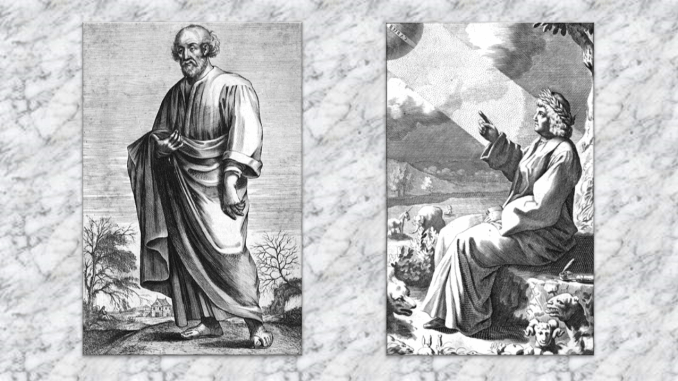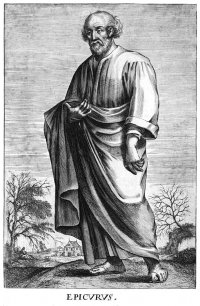
Epicureanism was one of the first schools of philosophy to emerge during the Hellenistic era – the period from the beginning of the reign of Alexander the Great in 336 BC to the Roman conquest of the eastern Mediterranean, conventionally dated from 31 BC.
During this Hellenistic age, the Greek city-states were transformed into administrative centres within a larger empire; they no longer had complete autonomy over their own laws, finances and armies. As a result, Greek philosophers shifted their focus away from the outer world of politics, towards the inner life of men.

Epicurus (c.341 – 270 BC) was an Athenian citizen and major philosopher of the Hellenistic period. He regarded the fear of death and punishment in the afterlife as the principal cause of anxiety amongst men and the source of their irrational desires. He tried to counter these fears by teaching that there was no afterlife; that the human body and soul were made up of atoms and they simply perished after death. The aim of his philosophy was to find happiness in this life, something which he thought could be achieved through the pursuit of moderate pleasures and by minimising physical pain and mental anxiety.
Epicurus set up a school in Athens to promote his philosophy, and his teachings eventually spread across the Hellenistic, and later Roman, worlds. His philosophical thought remained popular until the decline of the Roman Empire in the 5th century AD.
While Epicurus was a prolific writer, almost none of his own work has survived. We are, however, able to access his philosophical thought through the work of Diogenes Laertius and the Roman thinker, Lucretius (see below). Diogenes Laertius was a Greek writer of the third century AD who wrote The Lives of the Eminent Philosophers. This offers a biographical account of a number of important Greek philosophers, including Epicurus, and is a key source for those wishing to study ancient Greek philosophy.

Lucretius (c. 99 – 55 BC) was an Epicurean thinker during the late stages of the Roman Republic. He was alive at a time when Epicureanism was flourishing in Italy, nearly 200 years after Epicurus’s death. Other than that, there is very little we know of his life.
His major work, On the Nature of Things, is largely an exposition of Epicurus’s original philosophical thought, written in the form of a long poem. It is primarily a work of physics, detailing Epicurean thinking on the constitution of the universe and their theory of atoms. However, it also discusses Epicurean ideas regarding the pursuit of happiness, and touches upon the themes of pain and pleasure and how to counter the fear of death. In particular, Lucretius explains that there is nothing to fear in death since the soul is mortal, and nothing can harm us once nothing of us remains. Like Epicurus, Lucretius thought that this knowledge would give men peace of mind and enable them to live a life of happiness:
“…death is nothing to us, nothing
That matters at all, since mind we know is mortal…
…
…when the end shall come, when the close bonds
Of body and spirit that hold us here shall part
And we shall be no more, nothing can harm us
Or make us feel, since nothing of us remains…”
While On the Nature of Things is not an easy read, it is worth battling through the difficult parts, as it contains many beautiful passages of poetry. Indeed, some would argue that it is one of the greatest poems ever written.


